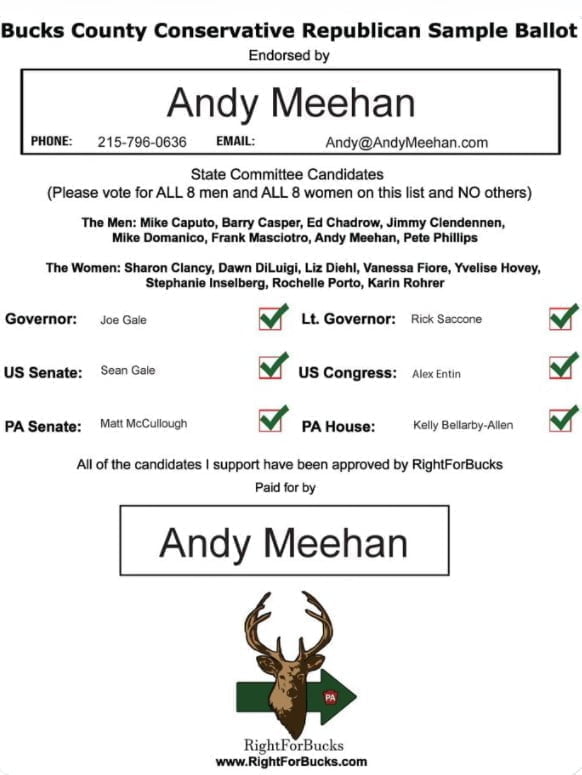The evidence seems to be piling up against Liz Diehl: Jennifer Mahler’s signature appears on Petition 17 for GOP candidate Dasha Pruett for U.S. Congress. Jennifer Mahler, of that address in Falls Township says, “I documented that it is not my signature.”
Theresa Armstrong, of Telford, which sits in both Bucks and Montgomery counties, says, “No, I didn’t sign that petition,” when asked about one for Pruett. Yet, there her name is on Petition 39.
Sherwood Taylor and his wife, Elaine Taylor, of Falls Township, were shown their signatures on Petition 6, another for Pruett. “These are not our signatures,” Sherwood Taylor said. “Not even close.”
On Pruett’s Petition 13 is the name Nona Walsh, from Hatfield. Her mother says, “She moved out three years ago, and lives in New Jersey. So, there is no way ‘Nona Walsh’ signed this petition in March.”

Petitions 6, 13, 17, and 39 are verified by the same person, a circulator named Liz Diehl, under this assertion: “I state the information set forth herein is true and correct, to the best of my knowledge, information and belief, and that this statement is made subject to the penalties of Pa18c4904s. § 4904 (relating to unsworn falsification to authorities).”
That same Liz Diehl, who could be subject to a third-degree misdemeanor charge if found guilty of verifying those petitions, is the Liz Diehl who last November was elected Judge of Elections for the Borough of Sellersville.
But wait. Diehl says she did not forge signatures. Rather, she says, she signed those pages and turned them in with spaces left to be filled.
Prompting the question: who forged the signatures? Because as we reported earlier, Pruett claims innocence as well.
In a statement that Diehl said her lawyer approved for release, she says: “I have spent countless hours of my own time collecting legitimate signatures for Dasha Pruett for Congress. It appears as though these petitions were subsequently altered with false signatures. The signatures were not my doing and they suspiciously all have the same handwriting.”
She then adds, anyone accusing her of “tampering” with petitions could be hit with a possible “liable” suit. Petitions by circulators other than Diehl appear also to have forged signatures, which, Diehl said on the telephone, “anyone with eyes can see,” many with “the same handwriting,” some of which were verified by the staff of the Bucks County Beacon in that previous story.
In other parts of the state, those who forged signatures and filed false petitions have been charged and prosecuted.
Seasoned circulators commonly end their sheets with a large X or a line to the bottom of the page, to indicate that the sheet is finished. That, of course, is to keep anyone from adding names to the sheet. Best practices, it is called.
Diehl is well-known in far-right Republican political circles. In addition to being an outspoken opponent of DEI in Pennridge School District, she is a Reopen Bucks member and an ardent Doug Mastriano supporter, the so-called “Christian nationalist” GOP candidate for PA governor. Mastriano has worked to overturn the last presidential election and was outside of the Capitol building during the Jan. 6 insurrection.

Pat Poprik, who has been chair of the Bucks Republican Committee for 10 years, and who, let us not forget, lent her signature to the fake slate of electors for Trump, to be presented on January 6, 2021, in case the insurrection at the Capitol, succeeded, has welcomed Diehl into Bucks politics. Diehl has been nominated as one of the 16 people to represent Bucks County on the Republican State Committee.
So, back to Diehl’s job as the Judge of Elections. Some consider it a ceremonial title. However, a November article in “The Atlantic” pointed out that Trumpers began targeting the slots for Judge of Elections and Inspector of Elections on the precinct level before the 2020 election. Loyalists were urged to write-in their names for these often-overlooked posts.
In Bucks County, 26 of the 33 write-in names for Judge of Election were Republican. Of the 17 of those who eventually ran in November, 11, including Liz Diehl, won.
In the Atlantic article, Victoria Bassetti, a senior adviser to the nonpartisan United Democracy Center, said “If people who are biased are elected to serve in these local positions anywhere in the country, it ultimately could have a huge impact on how our democracy functions.”
Scott Seeborg, the Pennsylvania state director for the nonpartisan group All Voting Is Local, had some calming thoughts for the Beacon. Basically, he says, the system is secure. “If we’re talking about James Bond stuff, it would take a lot to pull that off. The amount of coordination on a large scale is incomprehensible.”
The more likely threat, said Seeborg, “is a potential for them to create disruption.” The Judge of Elections is “an individual who is responsible for running the polling place.” In some cases, the Judge of Elections chooses the person who inspects the machines, he said. There can also be problems, he said, if the Judge of Elections claims not to understand the code, or creates problems with provisional ballots, or with first-time voters who have to provide a bank statement or utility bill. He suggests the cure is to have motivated and informed poll watchers because, he says, “people can gum up the works based on conspiracy theories, and absolutely wrong things.”






